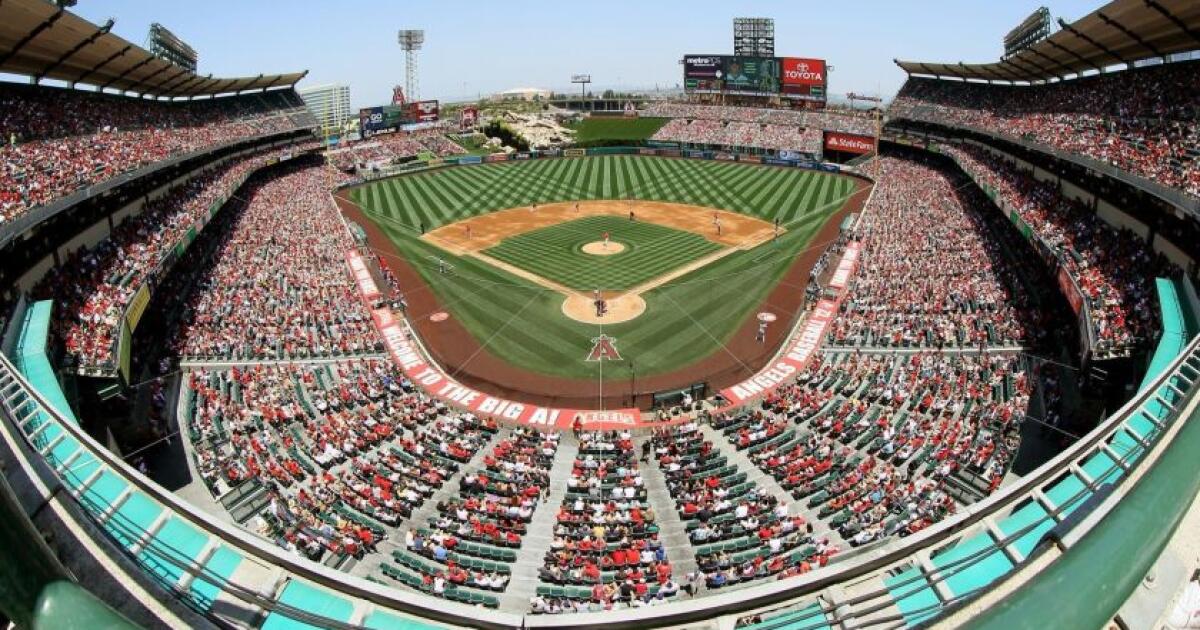The Angels have upheld their obligations under their stadium lease, the state auditor said in a report released Thursday, and disputes between the city of Anaheim and the team are largely the result of vague language in a lease that dates to 1996.
“We did not uncover any instances in which Angels ownership violated the terms of the lease agreement,” state auditor Grant Parks wrote in his report.
The only specific financial outcome of the report: Auditors discovered the Angels had overpaid $95,000 in ticket revenue to the city in 2021. The city agreed to refund the money to the team, the report said.
The Angels last month exercised their option to extend their stadium lease through 2032. They have two additional options, through 2035 and again through 2038. The city says there are no talks underway on a new deal with the team.
The audit, requested last year by state legislators representing the stadium area, was one of several actions pursued by elected officials after the collapse of a previous deal.
In 2022, after the release of an FBI affidavit disclosing a public corruption investigation of then-Mayor Harry Sidhu, the city killed the deal in which Angels owner Arte Moreno would have bought Angel Stadium and the surrounding property, renovated the stadium and built a neighborhood around it.
According to his plea agreement, Sidhu disclosed confidential city information to the Angels at a time when the city was negotiating with the team. He is scheduled to be sentenced Friday.
The collapse of the deal meant the Angels would remain a tenant at the stadium, under the terms of the 1996 lease.
In their audit request, State Sen. Tom Umberg (D-Santa Ana) and Assemblyman Avelino Valencia (D-Anaheim) cited “deep concern” that the team had withheld revenue owed to the city and failed to comply with stadium maintenance requirements stipulated in the lease.
That lease does not allow the city regular access for stadium inspections, meaning that the city “cannot ensure that its own stadium is properly maintained,” according to the report. The city and team have squabbled over access to the stadium for a property assessment authorized in 2023 that has still not been completed.
The city and team also have disagreed on the funding of maintenance and capital expenditures and the interpretation of “first-class stadium” in the lease, which requires Angel Stadium to be maintained on par with Dodger Stadium and Kauffman Stadium in Kansas City but does not define specific requirements or say as of what date those comparisons should be valid.
If the city and team cannot resolve those issues, Anaheim will “face the possibility of litigation,” the report said.
In accordance with the lease, the Angels pay no rent to play at the stadium, and share no ticket revenue with the city unless they sell more than 2.6 million tickets. The city agreed to waive rent because Disney, then owner of the Angels, paid for all but $20 million of a $117-million stadium renovation.
At the time of the 1996 lease, the Angels had sold more than 2.6 million tickets four times since moving into the stadium in 1966. Under Moreno — and in the wake of the only World Series championship in franchise history — the Angels topped 3 million every year from 2003-19. Attendance fell below 2.6 million in two of the last three full seasons; the Angels have not posted a winning record in 10 years.
“The failure of the Angels to put a decent product on the field means that the city is basically paying the Angels to play baseball in their stadium,” Umberg said in a statement.
The auditor also noted the lease allows the city to perform an audit twice per year to ensure the Angels’ compliance with the lease. According to the report, the city has conducted two such audits in the last 12 years.

